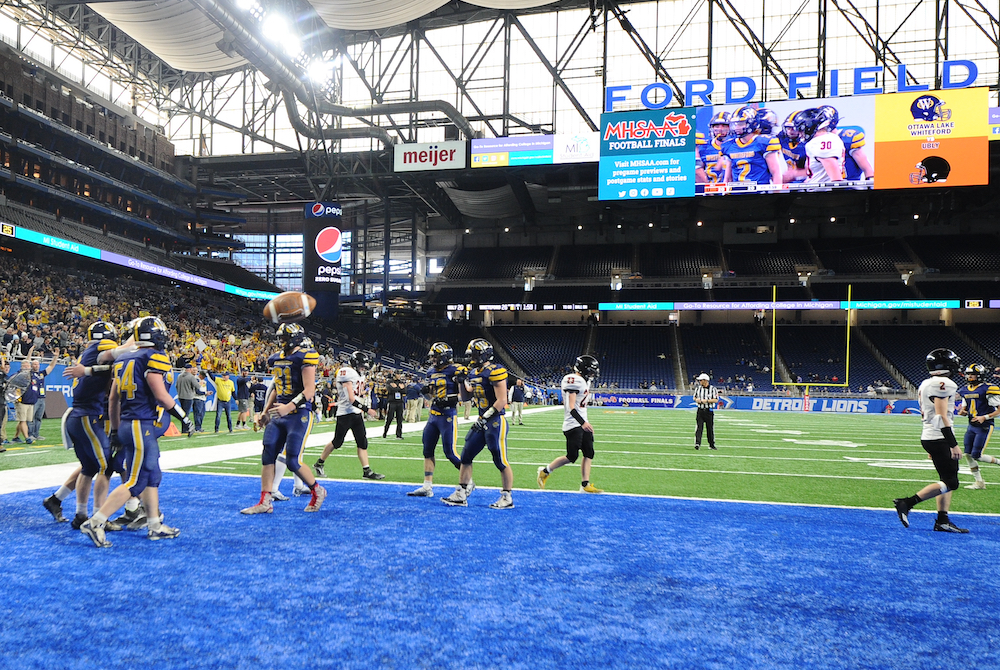
Wrong End of the Microscope
October 14, 2016
Those who love and lead high school football in Michigan may be looking through the wrong end of the microscope.
Attention to large schools, varsity programs and the postseason is a waste of time if we fail to closely examine smaller schools, lower level programs and the start of the season.
Are we adequately nurturing our roots and promoting the future of the game? Do high school coaches spend more time with civic and parent groups describing the benefits and defending the safety record of school-sponsored football than they do airing their grievances against other coaches in the media?
Do we understand how increasing the number and enrollment ranges of 8-player football programs affects our smallest schools, whether they conduct 11- or 8-player programs? Do we see where and how the same proposal can serve one school very well but another school terribly?
Do we understand what's happening in junior high/middle school programs? Do we play enough games to be attractive to kids and their parents, and do the practice policies and playing rules of this level promote an extra degree of participant health and safety?
Do we understand how starting practice so much earlier than academic classes in the fall may turn off kids and parents, especially at lower levels of play; and are we keeping up with rapidly changing calendar changes of member schools?
Ultimately, the future health of varsity high school football programs depends on the outcome of these kinds of questions, answers and efforts ... and has little to do with the size and system of the postseason playoffs. And positive efforts will be negatively affected by coaches airing dirty laundry in public.

Set, Ready, Challenge: 11-Player Football Finals Challenges New in 2022
By
Jon Ross
MHSAA Director of Broadcast Properties
November 25, 2022
New this year at the MHSAA 11-Player Football Finals is the opportunity for head coaches to challenge a call.
In previous years, all potential scoring plays and potential turnovers were automatically reviewed. That process will continue and now, under a limited set of circumstances, the head coach can challenge calls.
To do so, the head coach must first call a timeout. If a team has no timeouts remaining, they are not able to challenge a call. Challenges must be presented to the officials immediately after the timeout is granted. If the challenge is successful, the team will get its timeout back and have the ability to challenge one more call during regulation. A second successful challenge will not result in the ability to challenge a third call.
The following plays are reviewable by challenge:
- Complete/incomplete passes
- Runner/receiver in/out of bounds
- Runner ruled not down
- Forward progress spot as it relates to the yard to gain
- First touching of a kick
- Recovery of a ball in/out of bounds
- Forward/backward pass
- Penalties called on the field only for:
- Illegal forward pass
- Targeting or illegal helmet contact
- Pass interference only as it relates to the pass being previously tipped
NOTE: All other penalties called on the field are not reviewable. These include, but are not limited to: illegal formation, ineligible receivers downfield, illegal participation, illegal substitution or delay of game. If a penalty is not called by the officials on the field, the play can never be reviewed to retroactively call a penalty.
In overtime, challenges – like timeouts – reset. Each team has the ability to challenge one call for the entirety of overtime, but must have a timeout to use to do so. A successful challenge in overtime will not result in the ability to challenge a second call.
If a play is overturned in regulation or overtime, the replay officials will correct all aspects of the play including time, position of the ball and whether the clock will be started on the RFP or snap. The game clock or play clock may be reviewed only as it directly relates to the overturning of a call on the field.
There is no change to the review of potential scoring and potential turnover plays. Those plays are automatically looked at by the replay official and replay assistant. If the replay official can confirm the ruling on the field without stopping play, the official will do so. If more time is needed to review the play, the on-field referee will announce that and then will announce the replay official’s decision. For a play to be reversed, there must be indisputable video evidence that shows the original call was incorrect. Every attempt will be made to complete the review process in 90 seconds or less.
The addition of the coach’s challenge was approved by the MHSAA’s Representative Council at its May 2022 meeting.

